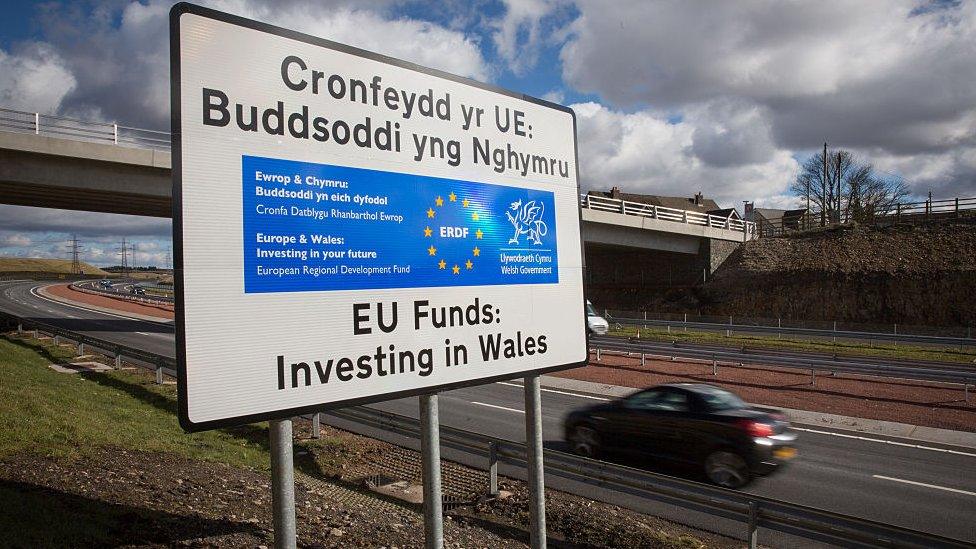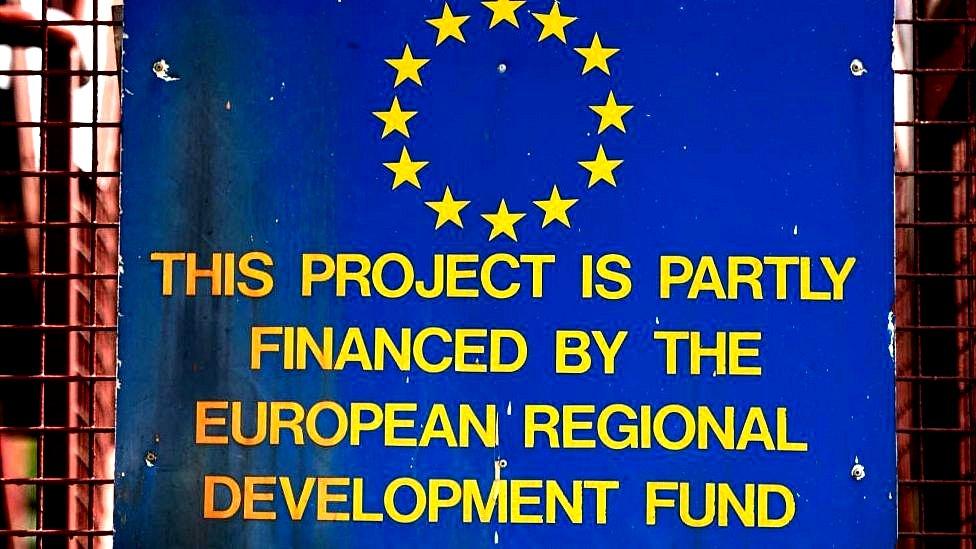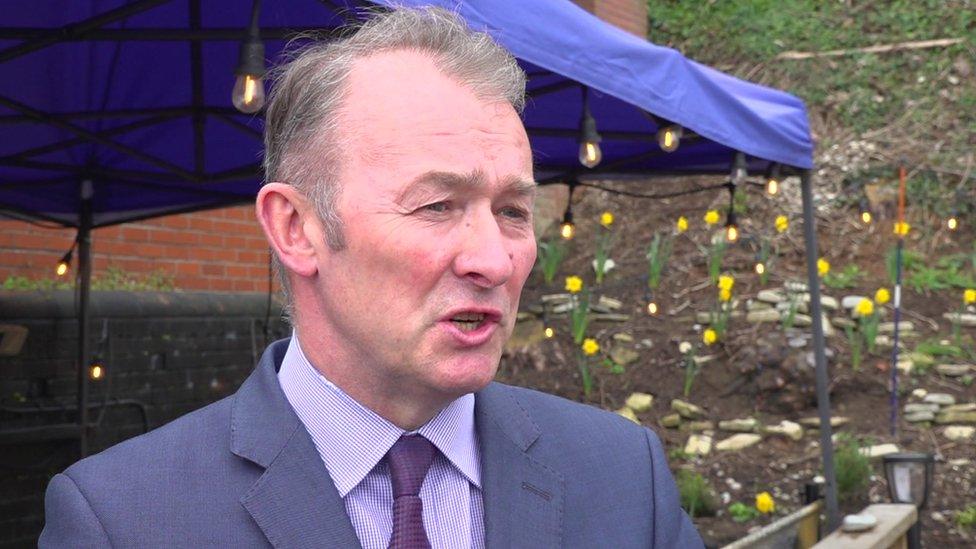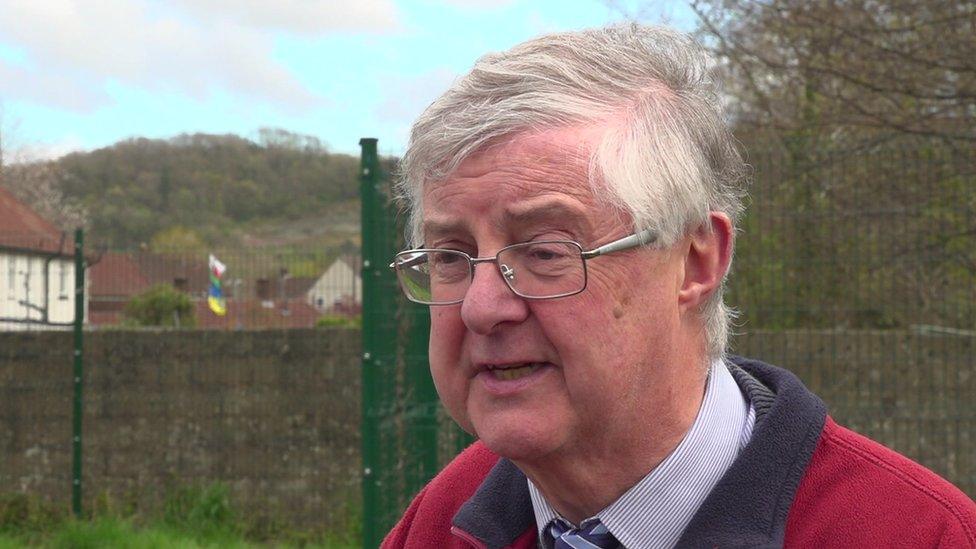New UK economic aid plan to give Wales £600m over three years
- Published
- comments

The Heads of the Valleys road was funded with EU aid
UK ministers say they will "slash bureaucracy and give control to locally elected leaders" in Wales in deciding how to spend nearly £600m over the next three years.
Ministers have announced details of a new Shared Prosperity Fund (SPF) to replace EU aid Wales used to receive.
The EU fund averaged £375m a year.
But Welsh First Minister Mark Drakeford said Wales was "£1bn worse off in this package" and "people whose need is greatest will be getting less".
That £1bn figure is the additional sum ministers in Cardiff say Wales would have received in EU aid by 2025.
Mr Drakeford said Wales would have "less money than we would have had if we had remained in the European Union, less say over how that money is to be spent but, as a result of intensive discussions over recent weeks, at least a greater alignment with the way we try and do things here in Wales".
There would be a "partnership with local authorities, [with] the Welsh government's policies also being involved", he told BBC Wales.
Plaid Cymru said the Conservatives had broken a promise to introduce a "fairer" programme more tailored to Wales' economy.
The UK government says it has met its manifesto commitment to match the previous EU funding by topping up residual funding from the old scheme until it fully replaces it in 2025.
Welsh Secretary Simon Hart said the new scheme is a "huge boost" for people across Wales "who will now have access to this fund to level up their communities and make decisions about where they want to see the money spent".
UK ministers say the new programme will be more flexible than its predecessor, helping "places right across Wales tackle local problems and seize new opportunities".

UK and Welsh ministers have been arguing over how EU aid should be replaced for years
Local authorities will be encouraged to work together on regional committees to decide how the money will be used.
The UK government says communities will be asked to draw up plans this year.
Charities and other third sector organisations are expected to have to apply to their local authorities for funding for projects.
It is not yet clear whether the Welsh or UK governments will have direct input into the spending decisions.
The announcement said: "Instead of regional agencies, funding decisions will be made by elected leaders in local government, with input from local members of parliament and local businesses and voluntary groups."
Under the EU aid system, the Welsh government administered the cash in agreement with the European Commission.

Simon Hart said claims Wales was being short changed were "demonstrably untrue"
The Levelling Up Secretary, Conservative MP Michael Gove, said: "We have taken back control of our money from the EU and we are empowering those who know their communities in Wales best to deliver on their priorities."
SPF cash will be allocated to areas across Wales based on a formula of regional need.
Mr Drakeford said the UK and Welsh governments had reached "common ground" on taking a "partnership approach" to the scheme and "making sure that all the people you need to make the best use of their money will have a say in how that money is to be used in Wales".
"The points of conflict remain the fact that we were given an absolute guarantee that Wales would not be a penny worse off through leaving the European Union and we're £1bn pounds worse off in this package," he said.
The other major area of dispute, the first minister said, was over how the money will be distributed.
"We argued hard with the UK government for a formula that would have matched the money that is available with where the need is greatest," said Mr Drakeford.
"In fact the formula that they have insisted upon gives less money per head of the population to those parts of Wales that have the greatest needs."
'They have broken that promise'
Plaid Cymru said "funding allocated to Wales should be spent by the government of Wales - not by Westminster and its out-of-touch Tory ministers".Plaid Westminster leader Liz Saville Roberts said: "The Tories promised in 2019 to replace EU cash with a programme that was 'fairer' and better tailored to Wales' economy.
"They have broken that promise. "Already below what was promised and failing to even match EU funding, this so-called Shared Prosperity Fund will leave Wales and our communities £1bn worse off."

Mark Drakeford said the Welsh government's funding formula would have been fairer
Speaking later, Mr Hart said claims that Wales was being short changed were "demonstrably untrue" and "Wales has actually never received more money since devolution" in 1999.
He accused the Welsh government of being focused on south east Wales, Cardiff and Newport in negotiations, telling the BBC "we were really surprised that they didn't really want to know about north Wales and mid Wales at all".
"So north Wales, mid Wales, west Wales get a bigger bite of the cherry than ever before," said the minister.
Welsh ministers were also "very keen" to "almost completely disregard rurality is as a factor when it comes to the funding allocations, and we thought that was wrong, too", he said.
"We don't see why people who live in rural parts of Wales should be disadvantaged by this."

A tranche of the money will be used for an adult numeracy scheme
But Mr Drakeford said this was "absolutely not true at all".
"The formula that we put to the UK government would have resulted in more money going to Bridgend, more money going to Wrexham, more money going to Ynys Mon than [under] the formula that they have insisted upon," he said.
"Our formula would have been fairer, our formula would have made sure that the money went to the places where it was most needed."
More than £101m of the cash will be used for an an adult numeracy programme, the UK government's Multiply scheme.
This programme is to help people with little of no maths skills into work, with free personal tutoring, digital training and flexible courses.
Welsh ministers see that as meaning Wales will be more underfunded than what they say the headline figures indicate, because a significant chunk of the cash is being reserved for this UK government activity.


Like most things in politics, the arguments between the two governments in London and Cardiff over the new funding scheme boil down to money and control.
The money argument is complicated - let's explore what the two sides are saying.
UK ministers promised Wales would not lose out on the average £375m a year it got under the EU scheme.
The Treasury insists it's kept that promise by topping up the final allocation of EU funds that Wales will continue to get until 2024. Then in 2025, it will give the full £375m.
But Welsh ministers say they would have received the equivalent of £1bn of new money - in addition to the final allocation from the previous funding period - if they were still in the EU scheme.
The Treasury rejects the £1bn figure. They point out the £375m figure is just an average - it doesn't mean the EU gave Wales that exact amount every year and in the first years of any new scheme the new money is always slow to drip through because it takes time for projects to be approved for new funding.
But the Welsh government's argument is that even if took a few years, they would still have received all the additional new money at some point during the new EU funding period, so they insist they are losing out.
The Welsh government are not the only ones making this argument - politicians in the English regions and Northern Ireland have made similar complaints.